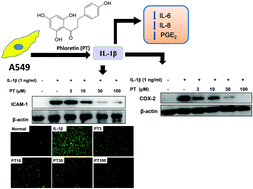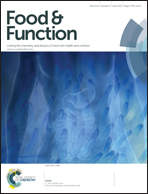Phloretin inhibits interleukin-1β-induced COX-2 and ICAM-1 expression through inhibition of MAPK, Akt, and NF-κB signaling in human lung epithelial cells
Abstract
Phloretin, a flavonoid isolated from the apple tree, is reported to have anti-inflammatory, anti-oxidant, and anti-adiposity effects. In this study, we evaluated the suppressive effects of phloretin on intercellular adhesion molecule 1 (ICAM-1) and cyclooxygenase (COX)-2 expression in IL-1β-stimulated human lung epithelial A549 cells. The cells were pretreated with various concentrations of phloretin (3–100 μM), followed by induced inflammation by IL-1β. Phloretin inhibited levels of prostaglandin E2, decreased COX-2 expression, and suppressed IL-8, monocyte chemotactic protein 1, and IL-6 production. It also decreased ICAM-1 gene and protein expression and suppressed monocyte adhesion to inflammatory A549 cells. Phloretin also significantly inhibited Akt and mitogen-activated protein kinase (MAPK) phosphorylation and decreased nuclear transcription factor kappa-B (NF-κB) subunit p65 protein translocation into the nucleus. In addition, ICAM-1 and COX-2 expression was suppressed by pretreatment with both MAPK inhibitors and phloretin in inflammatory A549 cells. However, phlorizin, a derivative of phloretin, did not suppress the inflammatory response in IL-1β-stimulated A549 cells. These results suggest that phloretin might have an anti-inflammatory effect by inhibiting proinflammatory cytokine, COX-2, and ICAM-1 expression via blocked NF-κB and MAPK signaling pathways.


 Please wait while we load your content...
Please wait while we load your content...